Google AI introduces Personal Health Agent (PHA): a multi-agent framework that enables personalized interactions to meet personal health needs
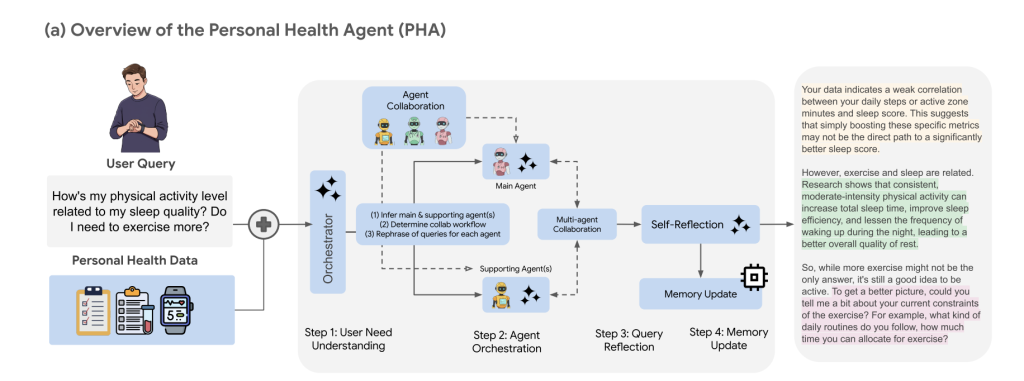
What is a personal health agent?
Large Language Models (LLMS) show strong performance in various fields such as clinical reasoning, decision support and consumer health applications. However, most existing platforms are designed as single-purpose tools such as symptom checkers, digital coaches, or health information assistants. These methods often fail to meet the complexity of real-world health needs, in which case individuals need integrated reasoning on wearable streams, personal health records, and laboratory test results.
A team of Google researchers proposed a Personal Health Agent (PHA) frame. PHA is designed as Multi-agent system This unifies complementary roles: data analysis, medical knowledge reasoning and health coaching. Rather than returning isolated output from a single model, PHA uses central orchestration to coordinate professional subagents, iteratively synthesize their outputs, and provide coherent personalized guidance.
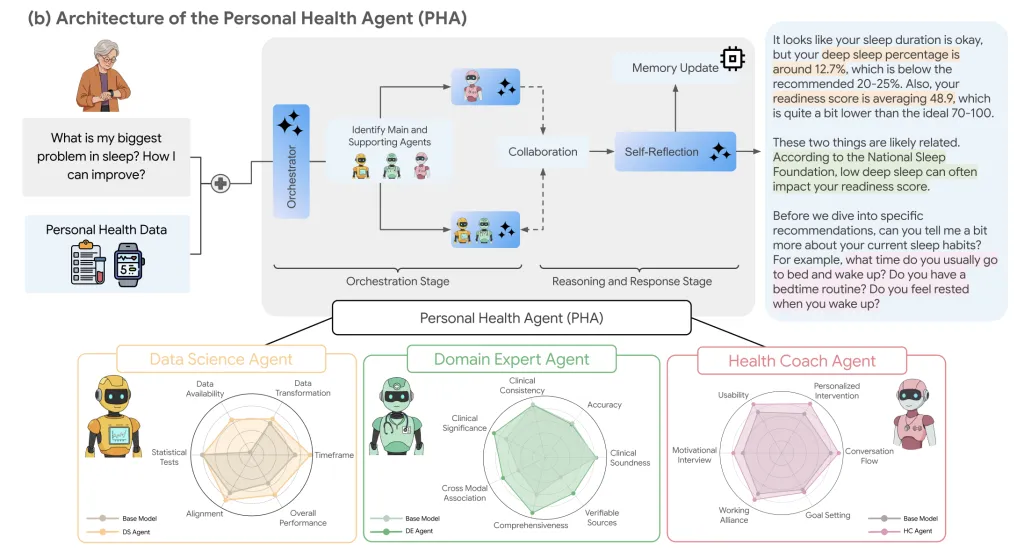

How does the PHA framework work?
Personal Health Agent (PHA) is built on the Gemini 2.0 model family. It follows a modular architecture consisting of three child agents and an orchestration:
- Data Science Agent (DS)
DS agents interpret and analyze time series data from wearable devices (e.g., step counts, heart rate variability, sleep metrics) and structured health records. It is able to break open user problems into formal analytical plans, perform statistical reasoning, and compare results with population-level reference data. For example, it can quantify whether physical activity in the past month is related to improvements in sleep quality. - Domain Expert (DE)
DE agents provide information about medical context. It integrates personal health records, demographic information and wearable signals to generate explanations based on medical knowledge. Unlike general LLMs that may produce reasonable but unreliable output, DE Agent follows iterative reasoning for investigation-censorship loops that combine authoritative medical resources with personal data. This enables it to provide evidence-based explanations such as whether a particular blood pressure measurement is within the safe range of an individual with a particular condition. - Health Coach Agent (HC)
HC agents address behavior change and long-term goal setting. From established coaching strategies such as motivational interviews, it conducts multiple transfer conversations, identify user goals, clarify restrictions and generates structured personalized plans. For example, it can guide users to set weekly exercise schedules, adapt to individual obstacles, and combine feedback from progress tracking. - orchestra
The orchestrator coordinates these three agents. When a query is received, it assigns a primary proxy that is responsible for generating the primary output and supporting proxy to provide contextual data or domain knowledge. After collecting the results, the orchestrator runs Iterative reflection loopcheck whether the output is coherent and accurate before synthesising them into a single response. This ensures that the final output is not only a summary of proxy responses, but also an integrated suggestion.
How is PHA evaluated?
The team conducted one of the most comprehensive assessments of healthy AI systems to date. Their evaluation framework involves 10 benchmark tasks,,,,, More than 7,000 human commentsand 1,100 hours of assessment From health experts and end users.
Data Science Agent Evaluation
The ability of the DS agent to generate structured analysis plans and develop the correct executable code is evaluated. Compared with the baseline Gemini model, it proves that:
- A significant improvement in the quality of the analytical program increased the average expert score from 53.7% to 75.6%.
- Critical data processing errors decreased from 25.4% to 11.0%.
- The code pass rate for the first attempt increased from 58.4% to 75.5%, and further improved with iterative self-correction.
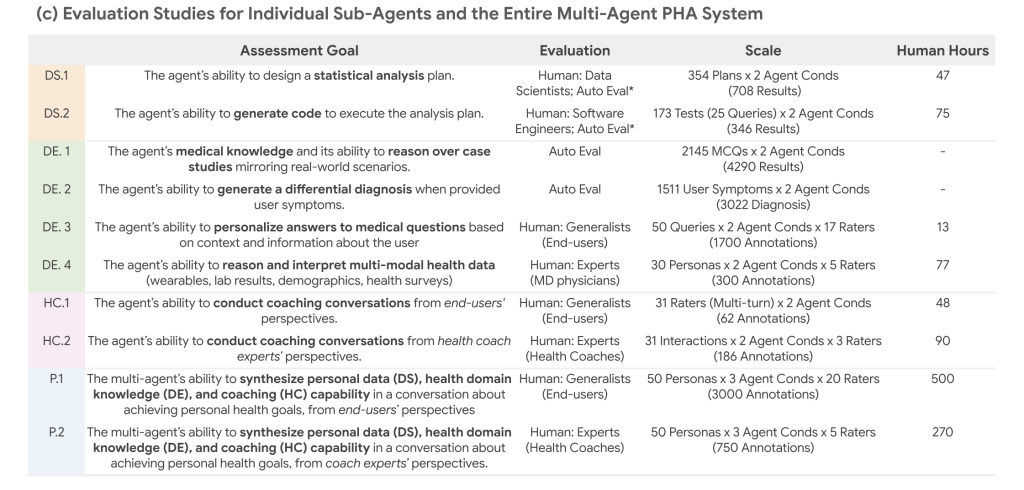

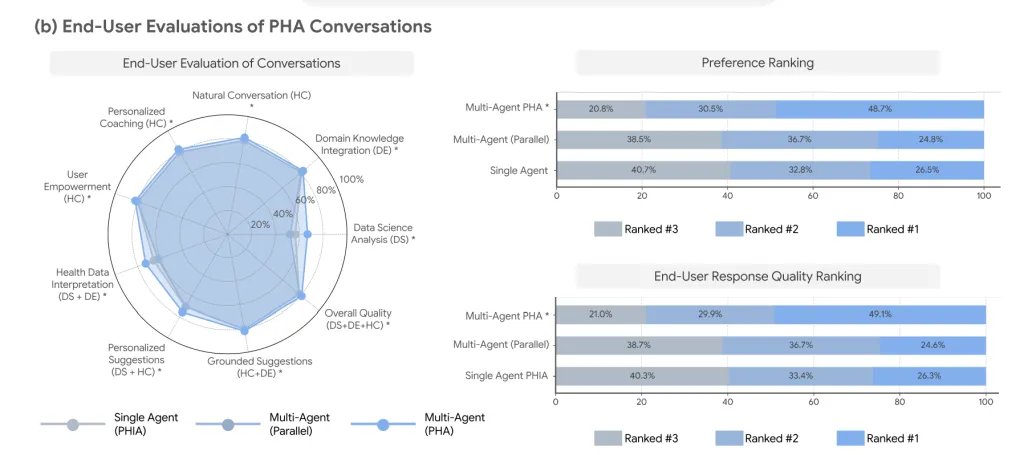

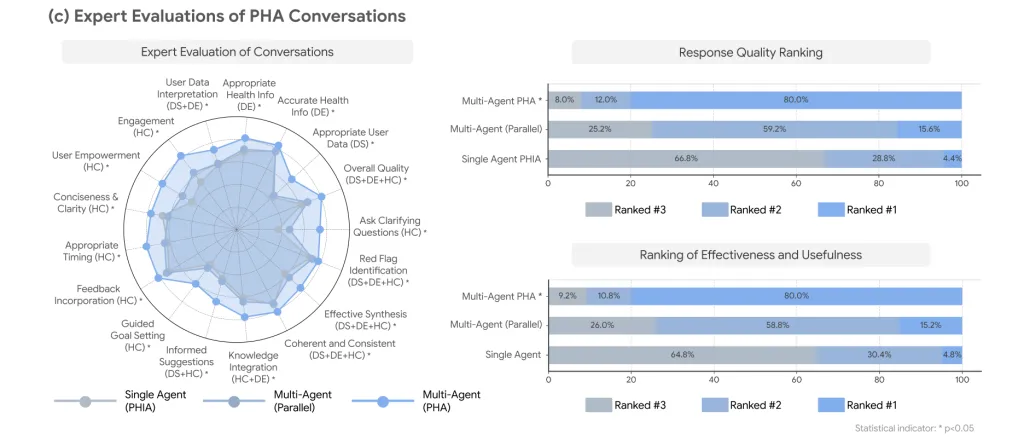

Evaluation of domain experts
The DE agent is benchmarked on four functions: factual accuracy, diagnostic reasoning, contextual personalization, and multimodal data synthesis. Results include:
- Facts and knowledge: De Agent achieved 83.6% accuracy on more than 2,000 board-style examination questions in endocrinology, cardiology, sleep medicine and fitness, performing better than baseline Gemini (81.8%).
- Diagnostic reasoning: In 2,000 self-reported symptom cases, it achieved TOP-1 diagnostic accuracy of 46.1%, compared with the state-of-the-art Gemini baseline of 41.4%.
- Personalization: In the user study, 72% of participants preferred the agent’s response to baseline output, citing higher credibility and contextual relevance.
- Multi-mode synthesis: In the comments of expert clinicians on health summary generated by wearable, laboratory and survey data, DE Agent’s output is more clinically meaningful, comprehensive and trustworthy compared to baseline output.
Assessment of health coach agents
HC agents are designed and evaluated through expert interviews and user research. Experts highlight the need for six coaching abilities: goal recognition, active listening, context clarification, authorization, intelligence (specific, measurable, measurable, relevant, time-combined) suggestions, and iterative feedback fusion.
In the evaluation, HC proxy showed improved conversation flow and user engagement compared to the baseline model. It avoids premature advice, but rather balances information collection and actionable advice, making the output more aligned with expert coaching practices.
Evaluation of integrated PHA system
At the system level, the orchestrator and three agents were tested together in an open multimodal conversation to reflect the real-life health. Experts and end users evaluated significantly higher in the measurement of accuracy, coherence, personalization and credibility than in the baseline Gemini system.
How does PHA contribute to healthy AI?
The introduction of multi-proxy PHA solves several limitations of existing healthy AI systems:
- Integration of heterogeneous data: Wearable signals, medical records and laboratory test results are analyzed together rather than isolated.
- Labor Department: Each secondary agent specializes in a domain where a single monolithic model usually performs poorly, such as numerical reasoning for DS, clinical basis of DE, and behavioral participation of HC.
- Iterative reflection: Orchestrator’s review cycle reduces the contradictions that usually arise when simply adding multiple outputs.
- System evaluation: Unlike most jobs that rely on small case studies, Personal Health Agents (PHAs) are validated by large multimodal datasets (wear ME studies) and extensive expert participation.
What is the greater significance of Google’s PHA blueprint?
The introduction of personal health agents (PHAs) shows that health AI can go beyond single-purpose applications Modular, well-planned system Ability to reason across multimodal data. It shows that breaking down tasks into professional subagents leads to measurable improvements in robustness, accuracy, and user trust.
It is important to note that this work is Research structure, not commercial products. The research team stressed that PHA design is exploratory and deployment will need to address regulatory, privacy and ethical considerations. However, the framework and evaluation results represent a significant advancement in the technological basis of personal health AI.
in conclusion
The Personal Health Agency Framework provides a comprehensive design that integrates wearable data, health records, and behavioral guidance through a multi-agent system coordinated by orchestrators. In statistical analysis, medical reasoning, personalization, and mentoring interactions, 10 benchmarks of thousands of annotations and expert evaluations showed consistent improvements in the evaluation of baseline LLM.
By using health AI as a coordinated system for professional agents rather than a monolithic model, PHA demonstrates that accuracy, coherence and trust can be improved in personal health applications. This work lays the foundation for further research in the agency health system and highlights a pathway to an integrated, reliable health reasoning tool.
Check The paper is here. Check out ours anytime Tutorials, codes and notebooks for github pages. Also, please stay tuned for us twitter And don’t forget to join us 100K+ ml reddit And subscribe Our newsletter.
Asif Razzaq is CEO of Marktechpost Media Inc. As a visionary entrepreneur and engineer, ASIF is committed to harnessing the potential of artificial intelligence to achieve social benefits. His recent effort is to launch Marktechpost, an artificial intelligence media platform that has an in-depth coverage of machine learning and deep learning news that can sound both technically, both through technical voices and be understood by a wide audience. The platform has over 2 million views per month, demonstrating its popularity among its audience.


